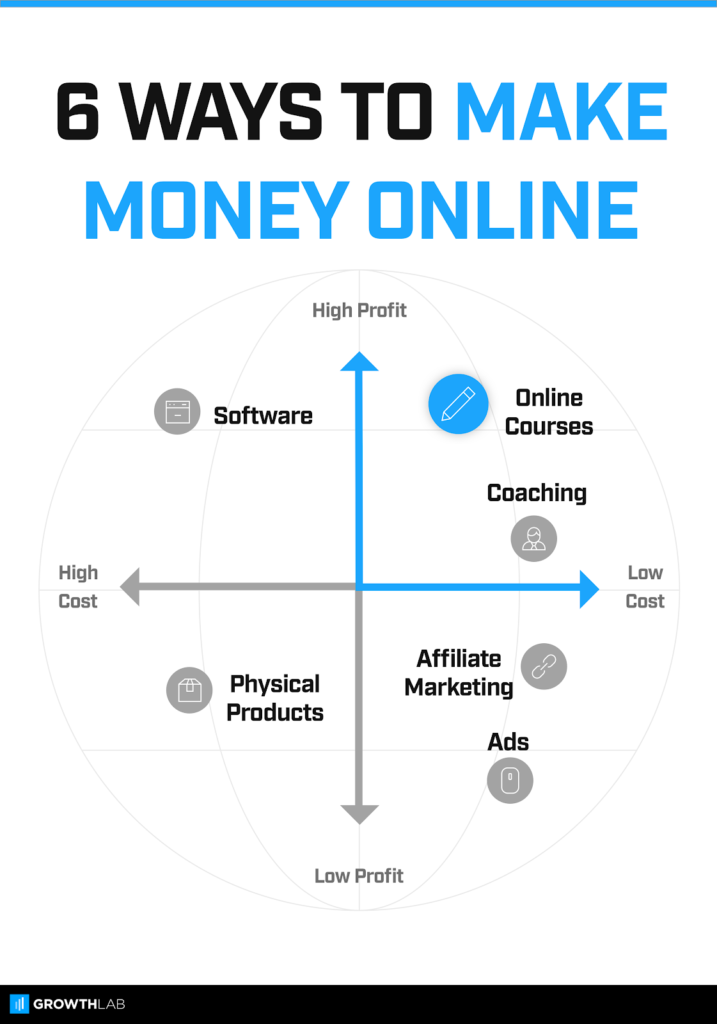
Startup Ideas: 20 (EASY) Low Cost, High Profit Margin Examples
An information product business gives you all of the benefits that come with starting your own company: an extra income stream, flexible work options, control over your life and time without needing a background in tech to do it. The problem with most startup ideas is that they come with all kinds of connotations.
Venture capitalists demanding their 10X return, ceaseless “hustle” to keep up with insane growth goals, hoodied tech bros vowing to “make the world a better place” through disruptive blockchain or whatever the “innovation” du jour happens to be.
If that’s not your cup of tea, you’re not alone — but don’t fall into the trap of thinking that means you can’t create a startup on your own.
You may not be able to build the next Uberor Snapchat. You may not wantto even if you could. But you can absolutely build an information product business of your own. And we can show you how.
What are information products and why are they great startup ideas?
Information products are products where the primary value you’re providing is the information they contain. Because knowledge, as they say, is power. And also, if you do it right, money.
Imagine all of the startup ideas in the world, graphed by cost and profit. Something like this:
That upper right-hand corner — ideas that are low cost AND high profit — that’s your sweet spot, and it is dominated by information products. (You’ll notice that software, while it’s high-profit, also comes with a lot of costs involved. And unless you’re planning to build the next Apple, physical products fall short on both the cost AND profit side.)
A few more things that make information products great:
They’re scalable. Once you have your product, you can scale startup ideas and not only sell to one person, but to 100 people, or 10,000 people — and you don’t have to change all that much about what you’re doing day to day to do it. (This is something that info-products and tech products have in common.)
The systems are already built. Everything you need to launch an information product business from a technical perspective already exists.
Building a website, recording and sharing videos, taking payments — there are software systems available to handle virtually every aspect of launching and running an information product business. (In fact, we have a guide that will show you everything you need to earn your first $10,000. Check it out.)
And that’s amazing, because it means A) you don’t have to know a thing about code to build your business, and B) you get to focus on the fun stuff. Stuff like:
- Talking to your customers
- Understanding who they are and what’s important to them
- Creating amazing info-products that knock their socks off
20 information product startup ideas
Information products come in four basic flavors and work particularly well for startup ideas: e-books, coaching, information products, and membership programs. Let’s look at them one by one:
E-books. E-books are a particularly greatoption for a first-ever information product, because they’re supereasy to make. You may not even have to create anything new in order to do it.
After you’ve been blogging on your topic for a while (which we recommend you do), you just pull together all the best, most useful content you have, and BOOM, you have an e-book.
Examples:
- Flexible Dieting Lifestyle Book of Recipes. Flexible Dieting Lifestyle founder Zach Rocheleau shows you that dieting and reaching your goals should be delicious and fun.
- How to Choose Paint Colours. Color theory and design expert Maria Killam shows you how to choose the right paint colors for your home decorating project. Hint: it’s all in the undertones.
- Blog by Number. Mom blogger Suzi Whitford shows fellow moms how to start a mom blog of their own.
- Intro to Bluetooth Low Energy.Mohammad Afanehwrote this e-book that shows tinkerers how to master Bluetooth Low Energy technology.
- What the Faute?Christina Rebuffet helps non-native English speakers eliminate 32 common mistakes from their English.
Coaching. Coaching is a low-barrier-to-entry info-product idea with sky-high earning potential. People want a human interaction and a personalized approach — and they’re willing to pay a premium to get it.
Want to build a business that enables you to live YOUR Rich Life? Get my FREE guide on finding your first profitable idea.
Not only that: you can also use coaching as a launch pad into developing other info-products. Once you’ve coached 10, 20, 50 clients, you’ll start noticing patterns in the questions they have and the things they get stuck on, and you’ll start to develop a system for helping them through. It’s basically market research that you get paid for.
Examples:
- Real Life E.Productivity expert Elizabeth Saunders offers time management coaching for people who feel overwhelmed by the demands of their day.
- Love Your Journey. Annie Huang offers the Wholehearted Living Workshop geared toward helping women heal after a breakup.
- The Essential Man. Style expert Peter Nguyen offers coaching to help professional men look and feel as successful as they are.
- Byte by Byte.Sam Gavis-Hughson coaches job-hunting coders looking to land jobs at top companies like Google or Apple.
- Personality.Media. Media and communications expert Jessica Eturralde coaches other online entrepreneurs on how to create engaging videos for their business.
Online courses. Online courses are a great way to deliver a ton of value for your customers withouttaking on a lot of risk. Offer a premium course with a few hours of video content, plus some worksheets and maybe an online community thrown in, and you can easily charge premium prices.
And, as we’ve already talked about, you don’t have to conjure your material out of thin air. Put in a few months (or years, or more — sometimes it takes time, and that’s okay) of blogging and/or coaching, and before you know it, you’ll have generated a ton of content that you can shape into an online course.
Examples:
- Study Hero. Tom Miller helps math, science, and engineering students “ace their exams and crush their courses, without the stress frustration, and long hours.”
- Fluent in 3 Months. Language learner extraordinaire Benny Lewis shows you how to master any language in three months.
- Successfully Growing Succulents. Succulents and Sunshine founder Cassidy Tuttle offers a premium course on building Pinterest-perfect succulents. SUCCULENTS!
- WordPress Without a Developer. WP Assurance founder Rob Howard shows entrepreneurs how to create a WordPress website without learning how to code.
- Audition Hacker.Rob Knopper helps professional classical musicians nail their orchestra auditions.
Membership programs. When you run a membership program as your startup idea, you put some (or maybe most) of your content behind a paywall, and customers pay a monthly subscription to access it.
Membership sites can be an awesome option, especially for topics like cooking, fitness, or musical instruments — topics where the subject matter lends itself to a steady stream of content.
Examples:
- DNG Inner Circle. Digital Nomad Girls founder Jenny Lachs’s paid membership offers bonus content, guest speakers, and events that non-paying site visitors can’t see.
- Golden Pick Monthly.Country Guitar Online offers tons of free resources for guitar players looking to master the fine art of country and bluegrass guitar. For the truly dedicated, there’s the Golden Pick Monthly subscription plan for even more guitar-picking goodness.
- Pencil to Pixel. James Daly offers online courses on lettering, illustration, design, and more. You can buy his courses one-by-one for $20 apiece — or opt for the membership plan and get access to every course and tutorial he’s made — past and future.
- Freelance Writers Den.Make a Living Writing founder Carol Tice runs this community for freelance writers looking to grow their income fast.
- Fierce Grace Collective. Carrie-Anne Moss leads this year-long membership program for women, providing community support and meditation practices as well as writings, teachings, and conversations.
How to find your information product idea
One last thing I forgot to mention that makes information products great choices for startup ideas : you can create an information product about almost anything.
Look at the info-products we’ve talked about in this post alone. There are products on food, fitness, gardening, home decorating. And if that’s not enough, here are a few dozen more info-product businesses you can check out.
At GrowthLab, we’ve helped thousands of students create their own profitable businesses, and we have a system for going from “no idea” to a guaranteed profitable business. I want to give that system to you now:
The Ultimate Guide to Profitable Business Ideas
In the guide, we’ll show you exactly how to come up with an idea that:
- People will be willing to pay for (because life’s too short to waste time on things customers don’t care about)
- You’re actually excited to build (because life’s too short to do things you don’t care about)
The only thing standing between you and starting a business of your own isn’t learning how to code or drumming up venture capital.
It’s just deciding that you want to build a business, and then taking advantage of the resources that are already in place to help you do that.
Why not start here?



